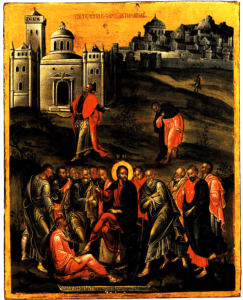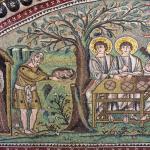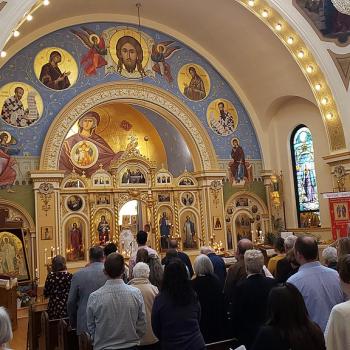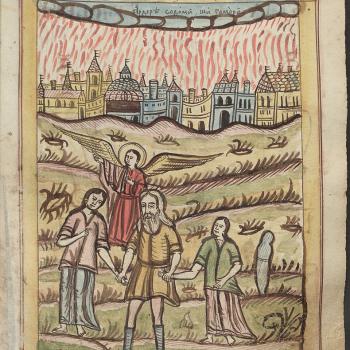
The parable of the Pharisee and the Publican is a very important one for anyone who claims to be religious. Christians need to pay careful attention to it and learn what it is telling them, for it warns them of what can happen with a legalistic or judgmental understanding of religious devotion. External acts of piety, while they might represent true devotion to God, are not in and of themselves a true indication that someone has the right kind of devotion to God. Many portray themselves as religious, and adhere to external rules of their religious faith as a way to hide their own inner spiritual dryness. It is a kind of coping mechanism. They want something out of their faith, and so what they think they can get is the respect of others. They hope, likewise, if they get such respect, God will then pay attention and also give them respect, and through such respect, be more willing to give them what they want. But the problem is that they have not truly accepted God’s examination and judgment of themselves, and as such, they are far from what God would like them to be. They have not yet accepted the need for mercy and grace in their own lives, and so they are unable to accept it, and without it, they have little to no mercy and grace to share with others. They are left with pride and the kind of judgment pride suggests to them: a judgment upon others all based upon externals, without any understanding of the inner spiritual life and grace which might be there.
God’s judgment always comes with grace, offering everyone the chance to be transformed and become perfect instead of trying to pretend to be perfect and not being it. So many would-be pious individuals will look at themselves, judge themselves to be great, and so not welcome and deny the grace which they need to truly be made great, while those who do not pretend to be great will welcome such grace
He also told this parable to some who trusted in themselves that they were righteous and despised others: “Two men went up into the temple to pray, one a Pharisee and the other a tax collector. The Pharisee stood and prayed thus with himself, `God, I thank thee that I am not like other men, extortioners, unjust, adulterers, or even like this tax collector. I fast twice a week, I give tithes of all that I get.’ But the tax collector, standing far off, would not even lift up his eyes to heaven, but beat his breast, saying, `God, be merciful to me a sinner!’ I tell you, this man went down to his house justified rather than the other; for every one who exalts himself will be humbled, but he who humbles himself will be exalted” (Lk. 18:9-14 RSV).
We must not look upon this parable with an antisemitic lens, assuming that Jesus was condemning Pharisees, and with it, the traditions the Pharisees taught. What was at issue is the way religion can and often turn people away from the spirit of religion as they try to deify themselves. That is, people who look only to the externals of their religious faith will do what they can to follow it in such a simplistic fashion; they will judge themselves to be great when they believe they have followed the external letter of the law, all the while they will condemn anyone who they deem does not do so themselves. Often, the means they use to do so is with their external acts of devotion: if people do not do just like they do, they think there is something wrong with them, something which needs to be corrected. The Pharisee in the parable can be and should be seen as potentially being any of us. Indeed, if we are honest, we often find ourselves slipping into the judgmental spirit of the Pharisee as we look to fellow Christians and judge them.
The publican, that is, the tax collector didn’t view himself to be a great spiritual man; he probably did not often go to the temple to pray, nor was it likely that he was made welcome in the local synagogue. He would have felt the hostility of everyone else, and because of being ostracized, turned inward in his religious faith. That is why when he actually engaged some external devotion, as he did here, he recognized his need for God and asked for God’s mercy and got it. He didn’t look to others to judge them; he just looked within and saw his own need for God and God’s grace and because he accepted it without condition, he left justified.
St. Maximos captured the spirit of this when he wrote:
It is not simply the doers of the law who will be justified, but rather those who in spirit practice the spiritual law understood spiritually according to the inner man. Those who so practice do not fall away from grace insofar as the Word has passed into the depths of their souls through purification. Those, on the other hand, who corporeally serve the outer aspects of the law completely fall away from divine grace, for they are ignorant of the perfection of the spiritual law, which through grace purifies the intellect from every stain, and whose perfection is Christ. [1]
As history shows us, Christianity often is turned away from the spirit of grace given to it, becoming, instead, a legalistic system, one which places all kinds of undue demands and expectations on the faithful. While grace continues to still be offered by God, in and through Christian institutions, because the focus has become so legalistic, many of the faithful feel cut off from God and grace in Christian institutions, and when they go, they rightfully feel uncomfortable, as they know something is wrong. The focus is all on externals, from aesthetics, to the rules and regulations put in place, but the people themselves are lost, and many who are the most humble and faithful feel cut off, if not actually hurt, by their fellow Christians.
The externals of the faith can and do change; with such change, what people consider pious will also change. Each time there is a change, people will circle around the externals and turn them into a legalistic system. The desire to keep everything based upon a simple legalistic paradigm leads many to ignore the true charism they have been given by the Spirit, a charism which would have them go beyond externals and to their own inner spiritual life and the transformation which needs to go on there. This is not to say the externals are completely unimportant, for they have a purpose and value, but that purpose and value must be to help the inner spiritual transformation and not get in its way or replace it. When the externals, when the law, becomes oppressive, when it causes extreme and unnecessary burdens upon believers, it needs to be reconsidered and changed. The faithful need to be reminded that it is not those who merely follow the externals, those who are only concerned about the external law, who receive God’s justification, but those who, in the depths of their heart, feel the need for God and welcome God’s grace in their lives wherever they are at, despite what they may or may not be able to do in respect to following the external law, who will receive it.
We must heed the lesson of this parable and remember it, all our lives. “But as for you, continue in what you have learned and have firmly believed, knowing from whom you learned it and how from childhood you have been acquainted with the sacred writings which are able to instruct you for salvation through faith in Christ Jesus” (2 Tim. 3:14-15 RSV). What has been handed down to us should help us have faith in Jesus, and in and through that faith, receive grace and salvation, We are to have hope, not despair. The parables of Jesus, like the parable of the Pharisee and the Publican, are about giving us that hope, reminding us that God transcends the dictates and expectations of those who would use religion as a tool for their own gain. God truly cares and will help all those who humbly ask for it, while those who are prideful in their external service for God have yet to truly understand what God wants and risk, through their religiosity, losing their salvation.
[1] St. Maximos the Confessor, On The Difficulties in Sacred Scripture: The Responses to Thalassios. Trans. Maximos Constas (Washington, DC: CUA Press, 2018), 137 [Question 18].
Stay in touch! Like A Little Bit of Nothing on Facebook.
If you liked what you read, please consider sharing it with your friends and family!
N.B.: While I read comments to moderate them, I rarely respond to them. If I don’t respond to your comment directly, don’t assume I am unthankful for it. I appreciate it. But I want readers to feel free to ask questions, and hopefully, dialogue with each other. I have shared what I wanted to say, though some responses will get a brief reply by me, or, if I find it interesting and something I can engage fully, as the foundation for another post. I have had many posts inspired or improved upon thanks to my readers.













